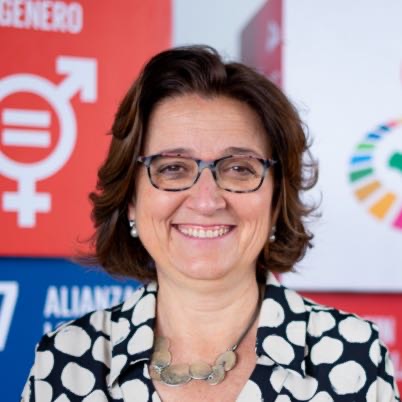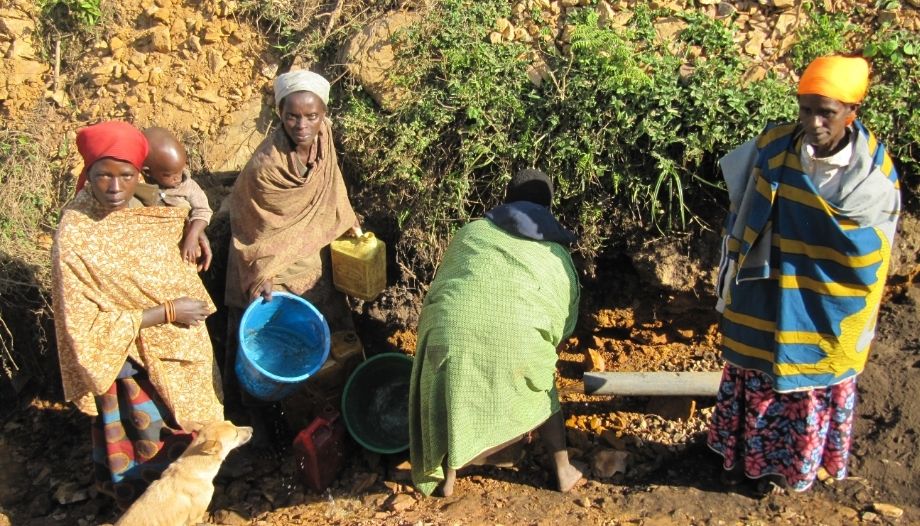More than half of the world's least developed countries face a serious debt overhang, estimated at US$9 trillion. In 48 developing countries, most of them in Africa, more resources are spent on debt interest payments than on guaranteeing basic rights for their populations. And this is "ethically unacceptable," says Mª Luz Ortega Carpio, professor of International Economic Organizations at Loyola University of Andalusia, in an interview with Omnes.
This over-indebtedness in fact affects 3.3 billion people, almost half of the 8 billion people on the planet, who live in countries that spend more on debt interest than on health. And 2.1 billion people, whose countries spend more on debt than on education, adds Professor Mª Luz Ortega, who is a member of the Spain Hub of 'The Economics of Francis' (EoF).
On the other hand, Spanish Catholic organizations have launched for the first time in history a Side Event (official Parallel Event), in the IV International Conference on Financing for Development from the UNwhich takes place in Seville. Professor Ortega considers this fact as "important".
Eduardo Agosta Scarel (Director of the Department of Integral Ecology of the Spanish Episcopal Conference, CEE) and Mª Luz Ortega Carpio participated in the Round Table yesterday. And also Agustín Domingo Moratalla (Professor of Moral and Political Philosophy at the University of Valencia and member of 'La Economía de Francisco'-EoF) and Elena Pérez Lagüela (doctor and professor of Economics at the UCM and expert on Africa).
Presented and moderated by Marta Isabel González (Advocacy and Alliances in Manos Unidas, and Communication in Enlázate for Justice and EoF). You can see more information on the Youtube channel of 'Link for Justice(Caritas, Cedis, CONFER, Justice and Peace, Manos Unidas and REDES).
We are already talking to the economist, Professor Mª Luz Ortega.
In this 4th UN Conference on Financing for Development, a 'Side event' was held, that is, an official Side Event, organized for the first time by various Spanish Catholic institutions. Can you assess this historic event?
- I do not know if it is a historical fact, but the fact that there is an official parallel event organized by Spanish Catholic institutions is important. It is important because we want to be a loudspeaker for everything that is being done at the Church level within the Jubilee framework. The theme, indeed, is 'Relief and cancellation of the foreign debt. A just ecological transition within the framework of the SDGs (Sustainable Development Goals). I have participated in this Round Table.

Tell us a moment about this event, on 'Foreign Debt Relief and Cancellation', which took place this Monday.
- When we talk about foreign debt, we have to think that it is affecting more than 3.3 billion people living on the planet, and we are currently close to 8 billion. The number of people who are deprived of having a dignified life, access to health, coverage of basic rights, is enormous.
This affects more than 40 countries, most of them in Africa, which pay more for the debt, for the interest on the debt, sorry, than what they spend on health, education, basic issues. This is something that we must become aware of, and really consider that this is not ethically acceptable.
In this Roundtable we have tried to address the proposals that we, from civil society, but also from Church groups, are going to support within the framework of the different reports that have been coming out. Especially, the Jubilee report, the initiative proposed by Pope Francis, of the Pontifical Academy of Social Sciences.
Behind debt forgiveness, we must be aware that it is not a matter of forgiving for the sake of forgiving. It is also about establishing a series of basic principles so that the debt is an assumable debt.
Can you break down any of these basic principles?
- Yes. Some of these principles are that there should be no net transfers from over-indebted countries. That is, sometimes money is lent to help, to alleviate. But because they have to pay back the interest on the debt, in the end it turns out that there is a net transfer from the over-indebted countries to us.
On the other hand, each indebted country should have a plan to analyze the situation according to its position. Restructuring should include capital reductions. It is also intended to look at the totality, that is to say, that the debts should be really debts to promote development.
What is at the heart of these criteria?
Basically, what is also behind it is the approach that many times, when the debt is going to be faced, it is said: well, you have to make an austerity plan. But the only thing that the austerity plan does is to increase the debt even more. But growth has to be possible. The only way out of this situation is to grow, but to grow in a balanced way, to grow focusing on sustainable development projects.
Keep in mind that this International Conference is taking place in the context of the need to rethink how to continue financing the Sustainable Development Goals, the 2030 Agenda. Because right now there is a gap of more than 4,000 million euros. All this would mean working from other keys.
It is also very important, as urged by various institutions, including those of the Church, that the international financial institutions, rather than seeking loan repayment, really serve the populations, really serve development.
You have talked about things that can be done.
- Having seen these principles, there are many things that can be done. Debt suspension initiatives can be carried out in the most serious cases. This has already been done in the past. For example, in the previous Jubilee (year 2000). Or the exchange of debt for education, for health, always with models of transparency. Or reconvert the special drawing rights so that they can help and finance developing countries.
In the Mesa's public explanation, there was a slogan: "It's people, not numbers: economy at the service of people and the planet". Expand on the idea.
- Yes, it is. This is something really important. As I was saying, to put the focus on people, to put a face to this situation of 3.3 billion people, almost half of the world's population. These are people who are deprived of having a dignified, happy life, a life that they have dreamed of and that everyone wants. They are deprived because the external debt that plagues their countries does not allow them to have those conditions.
Putting the economy at the service of people, at the service of the planet, has a lot to do with everything underneath the 2030 agenda, which focuses on the well-being of people and the planet. And if we don't achieve that, we are depriving people of all those opportunities. Sustainable development, in order to be a good development, has to generate economic growth, but it also has to be fair, a social development, therefore with equity, and it has to be beneficial and balanced for the whole planet.
Therefore, the economy has to be focused on achieving this, not on achieving a short-term profitability, or a profit. And many times those investments, or those loans that were given, were given in exchange either for rare earths, as is happening right now, or in exchange for a very short-term profit, but that does not benefit people's lives. And that is what we want: we want the economy to be focused on the benefit of the people.
An economist of 'The Economics of Francis' said, for example, that success should not be measured by the size or growth of GDP, but by its capacity to integrate everyone, to redistribute wealth. Any comments?
- Indeed, this must be so. The Gross Domestic Product is an indicator of economic growth, but if there is no redistribution of wealth, and not only of wealth, but also of well-being and the generation of capabilities, so that all people can live the full and dignified life they desire, this will not be possible.
That is why, among other things, the Jubilee document, and what Catholic organizations are asking, is that we do not think only in the short term, but in the medium and long term. In other words, debt is necessary. We have all borrowed money at one time or another. All countries have gone into debt, but it is necessary to go into debt in order to generate solid structures that really generate welfare for the entire population. Otherwise, we are talking about a bad development.
Finally, what do you ask for in the document 'The Seville Commitment'?
The Seville Commitment' was developed at my University in the framework of the Development Day, which we celebrate every year at the University of Seville. Loyola University Andalusia. We dedicated this year's Day to 'Debt or Development' and invited speakers. And as a result of it, the Declaration was issued by the Episcopal Conference and the Archdiocese of Seville.
A Declaration in which we come to ask for the cancellation of the debt, but also, aware of the difficulties of this total cancellation, a series of measures. These measures are fully in line with the Framework Document issued by the Pontifical Academy of Social Sciences in the Jubilee Report.
We call for a debt deal that puts people at the center. And look not so much at the amount of debt owed, but at how to solve this problem, and really promote development in the countries.







